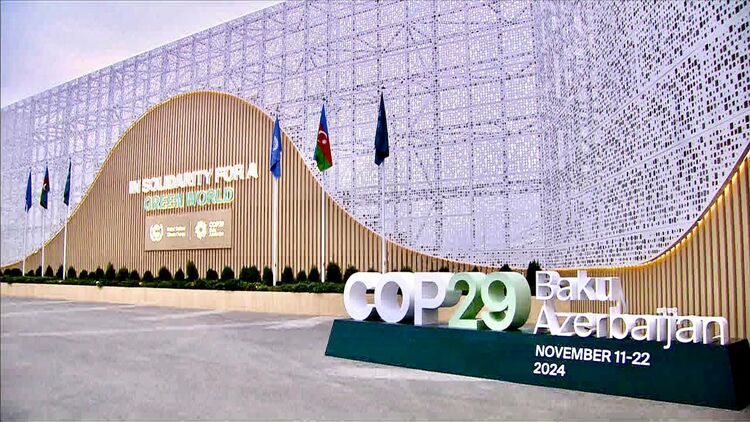Green Energy, Risk Management. How CA Solves Climate Issues

The consequences of climate change are acutely felt in Central Asia. Climate problems are becoming new obstacles to improving the quality of life of the population and implementing national development strategies. This was stated by the President of Uzbekistan Shavkat Mirziyoyev at the COP29 summit of world leaders on climate action in Baku.
According to him, the problems of overcoming poverty, food and energy security, access to water and resources are especially aggravated. And the main goal within the framework of the Paris Agreement is to prevent an accelerated increase in air temperature in the region, keeping it within 1.5-2 degrees in the current century.
In this regard, large-scale reforms to achieve carbon neutrality are being implemented in the Republic of Uzbekistan. By 2030, they plan to reduce greenhouse gas emissions by 35 percent. They intend to increase the share of green energy to 40 percent. In addition, clusters of electric vehicles and “green” hydrogen, solar and wind generation hubs are being created.
“It is important to expand technical assistance from leading countries and multilateral institutions to identify climate challenges that developing countries face. In this regard, we propose establishing an international center for assessing climate losses and damage. Unified approaches to preventing pollution of transboundary water resources and preserving sustainable biodiversity are also needed,” said Shavkat Mirziyoyev.
With the participation of leading structures, Uzbekistan plans to launch a regional bank of genetic resources to increase the resistance of plants to climate change and intends to promote the initiative to create an innovative UN agro-industrial hub for landlocked states in the republic.
In his speech, the head of Kazakhstan, Kassym-Jomart Tokayev, noted that despite the fact that Central Asia accounts for only 1 percent of global emissions, this region faces numerous climate risks.
“To improve the effectiveness of climate change response measures, we must actively use advanced technologies such as artificial intelligence, satellite monitoring, and other digital tools that provide early warning and more effective management of water and land resources,” he said.
Kassym-Jomart Tokayev emphasized the importance of transition to sustainable agriculture. Kazakhstan, according to him, is an ideal platform for the introduction of “carbon” farming, that is, such methods of agricultural production that reduce emissions and improve soil quality.
“Kazakhstan accounts for 43 percent of the world’s uranium supply and plays a significant role in the development of low-carbon nuclear energy. In October of this year, citizens of the country supported the construction of a nuclear power plant in a nationwide referendum. We strive to ensure the safety and efficiency of this project through partnership with global technology leaders in the field of energy,” the head of the Republic of Kazakhstan noted.
He also focused on the problem of global water resources. “Climate change is already having a serious impact on the global water cycle. Water-related disasters account for more than 80 percent of all natural disasters. This year, Kazakhstan has faced unprecedented floods. To respond quickly in the future and recover from such emergencies, we are introducing a comprehensive risk management system,” Kassym-Jomart Tokayev noted.
Speaking at COP29, Tajik President Emomali Rahmon said that 98 percent of the country’s electricity is produced through hydropower, i.e. green energy. “We intend to fully ensure energy production from renewable sources by 2032, based on our green economy development strategy, and to turn Tajikistan into a ‘green’ country by 2037,” he said.
Emomali Rahmon also noted that the Water Declaration for Climate Action is being adopted within the framework of COP29.
In this regard, he called for special attention to be paid to the issue of glacier melting, which is a result of the effects of climate change. In this context, at the initiative of Tajikistan, the UN General Assembly declared 2025 the Year of Glacier Conservation. This resolution defined World Glacier Day and established the Glacier Protection Trust Fund.
The problem of melting glaciers was also raised in his speech by the head of Kyrgyzstan Sadyr Japarov. According to him, over the past 70 years, the area of glaciers in the republic has decreased by 16 percent, in some regions almost all glaciers have disappeared, and by 2100 we may lose more than half of them.
The President also addressed the issue of achieving carbon neutrality, a mechanism for exchanging external debt for green projects, and the development of mountainous regions.
Let us recall that the 29th Conference of the Parties to the UN Framework Convention on Climate Change is being held in Baku from November 11 to 22. About 100 heads of state and government, 150 delegations from all over the world are taking part in the work.
https://24.kg/obschestvo/310905_zelenaya_energetika_upravlenie_riskami_kak_tsareshaet_klimaticheskie_problemyi/

